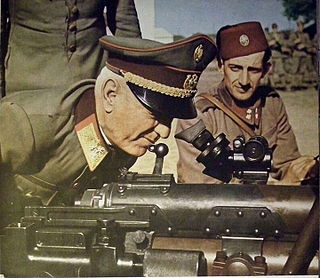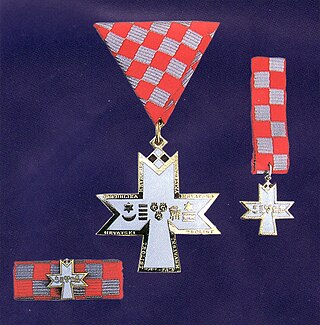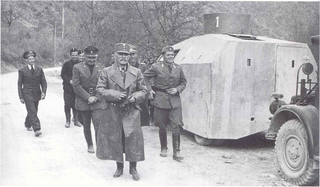During World War II the Independent State of Croatia awarded a number of orders, decorations and medals.
During World War II the Independent State of Croatia awarded a number of orders, decorations and medals.
After the early April 1941 invasion of Yugoslavia, the Kingdom of Yugoslavia was crushed, and the so-called Independent State of Croatia was established with Ante Pavelić as the Head of State. As the Ustasha government of Yugoslavia were allies of the German Nazi government, the orders and decorations of Croatia from World War II remained secret until 1990 when Croatia became independent.

On 10 April 1945 the Velebit medal (Velebitska kolajna) for bravery (silver and bronze) was added to the order of Croatian decorations. It was created on 1 January 1932 in Italy, and awarded to soldiers who participated in a diversion in Lika village Buršani (7 September 1932).
By declaration of the Croatian government on 10 October 1943, small signs (ribbons) were added as decorations. Ribbons were made for military personnel and worn on uniforms.
Since 1942, decorations of Croatia have been made in the Zagreb mint, "Braća Knaus" (Brothers Knaus) (former "Griesbach & Knaus"), and in the workshop of Teodor Krivak in Varaždin (former "Sorlini").
The Order of the Crown of King Zvonimir was made from the design of air force colonel Jakob Machiedo. Colonel Machiedo's design incorporated art elements from the oldest Croatian culture heritage, the trefoil ornament.
The Medal of the Crown of King Zvonimir and the Medal of Poglavnik Ante Pavelić for bravery were made by the Croatian sculptor Ivo Kerdić. The Order of the Crown of King Zvonimir and The Military Order of Iron Trefoil have the shape of the Trefoil Cross. The Trefoil Cross has become famous and is known in world literature as the "Croatian Cross".

Knighthood in the Independent State of Croatia was conferred by the state during its existence from 1941 to 1945. The title of vitez, or knight, was awarded to recipients of certain state orders and awards.
The following awards granted the title: [1]
The title was awarded to 26 generals:
Colonels to receive the title included:

Ante Pavelić was a Croatian politician who founded and headed the fascist ultranationalist organization known as the Ustaše in 1929 and served as dictator of the Independent State of Croatia, a fascist puppet state built out of parts of occupied Yugoslavia by the authorities of Nazi Germany and Fascist Italy, from 1941 to 1945. Pavelić and the Ustaše persecuted many racial minorities and political opponents in the NDH during the war, including Serbs, Jews, Romani, and anti-fascists, becoming one of the key figures of the genocide of Serbs, the Porajmos and the Holocaust in the NDH.

The Independent State of Croatia was a World War II-era puppet state of Nazi Germany and Fascist Italy. It was established in parts of occupied Yugoslavia on 10 April 1941, after the invasion by the Axis powers. Its territory consisted of most of modern-day Croatia and Bosnia and Herzegovina, as well as some parts of modern-day Serbia and Slovenia, but also excluded many Croat-populated areas in Dalmatia, Istria, and Međimurje regions.

Prince Aimone, 4th Duke of Aosta was a prince of Italy's reigning House of Savoy and an officer of the Royal Italian Navy. The second son of Prince Emanuele Filiberto, Duke of Aosta he was granted the title Duke of Spoleto on 22 September 1904. He inherited the title Duke of Aosta on 3 March 1942 following the death of his brother Prince Amedeo, in a British prisoner of war camp in Nairobi.

Slavko Štancer was a Croatia commander-in-chief and inspector-general of the land component of the Domobranstvo in 1941, the army of the Independent State of Croatia during the Second World War. His surname is also sometimes written "Stanzer" or "Stancer".

Vladimir Maček was a politician in the Kingdom of Yugoslavia. As a leader of the Croatian Peasant Party (HSS) following the 1928 assassination of Stjepan Radić, Maček had been a leading Croatian political figure until the Axis invasion of Yugoslavia in 1941. As a leader of the HSS, Maček played a key role in establishment of the Banovina of Croatia, an autonomous banovina in Yugoslavia in 1939.

Poglavnik was the title used by Ante Pavelić, leader of the World War II Croatian movement Ustaše and of the Independent State of Croatia between 1941 and 1945.

The Military Order of the Iron Trefoil, also known as the Croatian Cross, was the highest military decoration of the Independent State of Croatia. It was awarded for "acts of war, achieved by personal incentive, for efforts and good leadership in ventures, which had remarkable success against the enemy."

Slavko Kvaternik was a Croatian Ustaše military general and politician who was one of the founders of the Ustaše movement. Kvaternik was military commander and Minister of Domobranstvo. On 10 April 1941, he declared the creation of the Independent State of Croatia.

The system of honours of the Republic of Croatia was established after the independence of Croatia in 1991. There are nineteen main decorations conferred since 2019, in addition to several other medals and awards.

The Order of the Crown of King Zvonimir was an order awarded by the Independent State of Croatia (NDH). It was established as a "visible sign of decoration for merits done, in peace or in war, for Croatian people and Independent State of Croatia" It was established by Croatian leader Ante Pavelić on May 15, 1941. The bearers of the grand order and bearers of the first class order were given the title of knight (vitez).

The Croatian Armed Forces were formed in 1944 with the uniting of the Army of the Independent State of Croatia and the Ustaše militia in the Independent State of Croatia. It was established by the fascist regime of Ante Pavelić in the Independent State of Croatia (NDH), an Axis puppet state in Yugoslavia during World War II.

The Grand Order of King Dmitar Zvonimir or more fully the Grand Order of King Dmitar Zvonimir with sash and Morning Star, is an order of the Republic of Croatia. It ranks fourth in the Croatian order of precedence, after the Grand Order of King Petar Krešimir IV. The order is among only four orders that hold the title of grand order, and has one class like all Croatian orders and decorations.

Franjo Šimić was a Croatian colonel, and later general, in the Croatian Home Guard.

The Light Transport Brigade was a military unit of the Independent State of Croatia's Croatian Home Guard which fought alongside the Royal Italian Army on the Eastern Front. It was attached to the 3rd Cavalry Division of the 8th Italian Army, which was in turn subordinate to the German Army Group B.

The Order of the Croatian Trefoil is the sixteenth most important medal given by the Republic of Croatia. The order was founded on 1 April 1995. The medal is awarded for excellence in war, direct war danger or in extraordinary circumstances in peacetime.

The Medal of the Crown of King Zvonimir was founded as a "visible sign of decoration for merits done, in peace or in war, for Croatian people and Independent State of Croatia."
Medal of Poglavnik Ante Pavelić for Bravery is founded as a "visible sign of decoration for acts of personal bravery in combat". Poglavnik of Croatia has awarded with this medal officers, NCOs and soldiers of Croatian Armed Forces who showed personal bravery in combat. It was possible that medal be awarded to members of foreign armed forces, and those members were needed to be involved in combat along with Croatian soldiers. Medal for bravery had four grades:
Edgar Angeli was a Croatian rear admiral who served as the commander of the Navy of the Independent State of Croatia between 1943 and 1944.

Vilko Begić was a Croatian military officer.
Eduard Bona-Bunić was a Croatian World War II soldier and member of the Bunić family, an old Austro-Hungarian noble family.